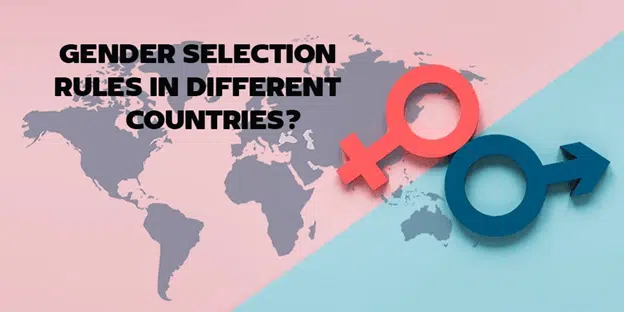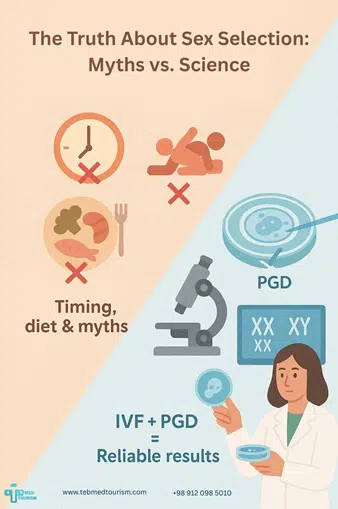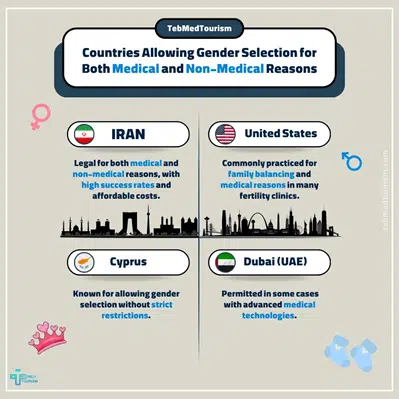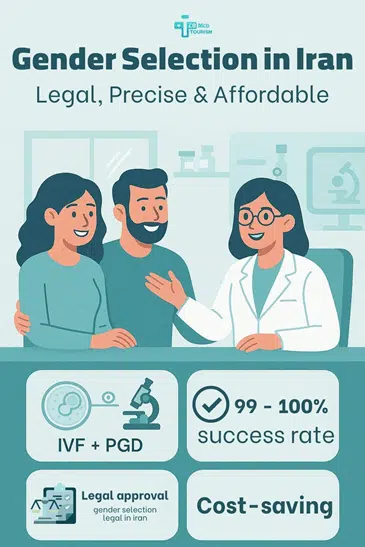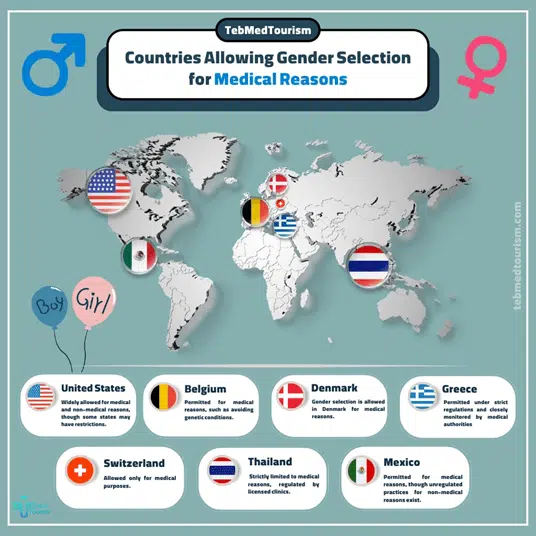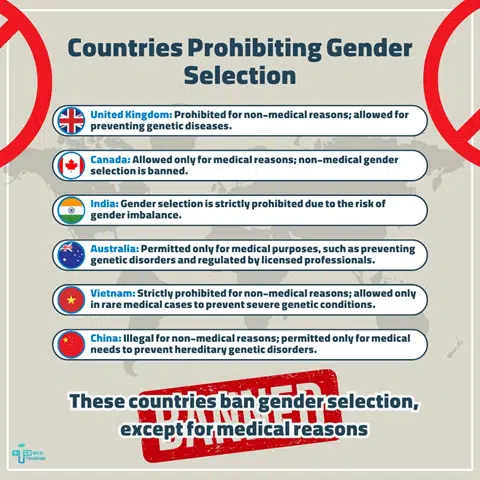Today, with the advancements of assisted reproductive technology (ART), many couples may think about gender selection rules in different countries. Now it is possible to choose the gender of the child with a noticeable reliability. There are different things that one can do to get the desired-sex baby.
One way is terminating the pregnancy if the embryo does not have the desired sex of the parents. The other method is the use of the preconceptual technique of separating X and Y sperm. This technique raises the chance of having a girl from 50% to 85% and increases the chance of having a boy from 50% to 65%.
The third way of selecting the baby’s gender is using the postconceptual method of IVF (in vitro fertilization) and PGD (preimplantation genetic diagnosis). This method offers a high chance of pregnancy with the desired-sex embryo, which is nearly 100 percent. This method is recently used, and it is a reliable method of selecting the gender without terminating the pregnancy.
IVF gender selection rules vary in different countries. Gender selection is not legal all around the world; therefore, many couples may think about going through this process internationally.
For foreign couples, Iran is one of the best countries for undergoing gender selection, where other assisted fertility technologies, such as egg donation, microarray genetic screening, etc., are legally practiced with the same quality as in the western countries.
But first, let’s learn more about this subject and see the gender selection rules in different countries.
What is Gender Selection?
Gender selection, also referred to as gender determination, is a medical procedure that gives parents the ability to choose their child’s gender. Only embryos of the desired gender are transferred to the uterus using this method. As a result, the family has a healthy child whose gender they chose.
Although there are a number of reasons to favor gender selection, it is also frequently employed to treat disorders that run in families.
All of the embryos taken from the couple undergo chromosomal genetic research, which provides information about the sex and health of the unborn child in Gender Selection/Gender Determination. Therefore, the baby’s gender and overall health are 99.9% justified.
When it comes to gender selection in Islam, most religious scholars believe that it is discouraged for non-medical or social reasons but permitted for medical ones, such as preventing inherited diseases. Fertility clinics follow these moral guidelines to guarantee religious observance in countries like Saudi Arabia and Iran, where Islamic law affects medical ethics.
In Which Countries Is Gender Reveal Legal?
Many people mistakenly search online for “gender reveal is legal in which country” or “baby gender reveal is legal in which country” when they are actually looking for information on “gender selection.” This confusion stems from the fact that both terms involve the concept of determining the baby’s gender, but in very different ways.
A gender reveal simply refers to the moment when the baby’s gender is disclosed, often with a fun, celebratory event, and is typically determined through ultrasound or other non-invasive methods. In contrast, gender selection refers to the use of medical techniques to choose the gender of the baby before conception or implantation, which is a highly regulated process in many countries.
While gender reveal parties are generally legal and celebrated in many parts of the world, the legalities change when discussing gender selection. In most countries, such as the United States, the United Kingdom, and Canada, hosting a gender reveal party is perfectly legal.
It’s a joyful occasion where the gender of the baby is shared, often in creative ways, and it doesn’t pose any legal or ethical concerns. However, gender selection for non-medical reasons is a different matter. In these countries, gender selection is usually only allowed for medical purposes, such as avoiding sex-linked genetic disorders.
On the other hand, some countries, including India, China, and certain Middle Eastern nations, have stricter regulations around gender selection due to concerns about gender imbalances.
While gender reveal parties themselves are generally not a legal issue, the use of technology to determine gender for purposes other than medical necessity can be heavily regulated or even prohibited in these regions.
Therefore, while gender reveals are celebrated around the world, the legality of gender selection varies greatly depending on local laws and cultural attitudes toward gender and reproductive technology.
Gender Selection and Religious Ethics
In Islam, gender selection promotes medically based methods of preventing inherited illnesses. Regarding the use of contemporary medical technologies such as IVF and PGD, religious scholars stress the significance of intention and ethical behavior.
Iran and other Islamic nations, therefore, control gender selection in order to promote patient welfare and moral principles.
How does sex selection work?
So many couples have tried to have an impact on the gender of their future baby by using different ways. They may have heard a lot of recommendations from others about their diet, intercourse timing, intercourse positions, or using chemical douches. However, these methods are all unreliable and cannot have a high success rate.
A reliable and practical sex selection works only when you have embryos through the IVF procedure. PGD or PGS are techniques for detecting genetic disorders in order to discard the embryos having genetic abnormalities and pick the desired gender to grow into the uterus.
The sex of each fetus is determined by two pairs of X and Y chromosomes.
One pair is inherited from the mother, and the other pair is inherited from the father. By testing a sample group of cells belonging to the embryo, its chromosomal makeup would be detected. Then, just the desired-sex embryo will be implanted into the uterus.
Gender Selection Reasons
Gender selection is a controversial subject all around the world. There can be two main reasons for doing this process: medical-based and non-medical-based reasons. Some couples go through a gender selection process because they want to avoid genetic diseases related to a certain gender.
For instance, the intended parents may carry genes for hemophilia or muscular dystrophy, which can only affect male babies. In this condition, they can often legally pursue a gender selection process to have a baby girl because they have a medical reason.
Some other couples may use gender selection techniques for non-medical reasons, like fulfilling their personal preference or as a way of balancing their family. For example, they may have two girls and prefer to have a boy as their third kid, or they might be more comfortable with raising a kid with a specific gender.
The World Health Organization (WHO) declared an objection toward gender selection for non-medical reasons because this action can cause moral, legal, and social conflicts. They discuss that manipulating the natural sex ratio can lead to gender imbalance and possible gender discrimination by devaluing females in some nations. Nevertheless, this method also has its own advocates.
They say that mankind should have the liberty to choose their own reproductive path. Gender selection helps people wisely choose the desired sex for their baby so that they can be more comfortable raising them.
IVF Gender Selection Legal Countries 2025
Considering the countries where gender selection IVF is legal, you should know that IVF gender selection rules are different worldwide. The prohibition of sex selection in some countries has caused a significant number of couples to look for sex selection services abroad.
The circumstance in which a number of people are travelling abroad in order to undergo gender selection, the egg donation process, and other infertility treatments is called “reproductive tourism.”
Where sex selection is banned, people usually travel to countries such as the United States,
Mexico, Italy, Cyprus, and many Asian countries like Iran and Thailand. When you want to choose a suitable destination for sex selection, you can consult with your local fertility specialist to get some advice about reliable clinics before taking any actions.
It is recommended to choose a safe country in which the costs are more affordable, at the same time as the “cheapest country for gender selection.” Iran can be named as a great option regarding the high-quality facilities and affordable prices. Our experts at TebMedTourism Co. can guide you to get a precise result on the sex selection process.
Is gender selection legal in the United States?
Gender selection is a controversial topic in the United States, and the laws regarding it vary from state to state. In some states, it is legal to use gender selection for medical reasons, such as to avoid passing on genetic disorders.
However, in other states, it is illegal to use gender selection for non-medical reasons, such as to choose the sex of a child for personal preference. The American Society for Reproductive Medicine (ASRM) has issued guidelines stating that gender selection should only be used for medical reasons and not for personal preference.
The ASRM also recommends that gender selection should only be performed by qualified medical professionals and that patients should receive counseling before making a decision.
Is Gender Selection Legal in Iran?
Yes, Gender selection in Iran is legal and is commonly used for medical reasons, such as preventing genetic diseases, and also for non-medical reasons. Iran is among the family balancing legal countries, allowing parents to choose their preferred gender through approved medical procedures. The success rate of sex selection in Iran is very high, close to 100 percent.
The process involves IVF with PGD, where embryos are screened for the desired gender before being implanted in the mother’s uterus.
With advanced reproductive technologies, highly experienced physicians and embryologists, and affordable medical and non-medical services, Iran is considered one of the best destinations for gender selection. Our experts at TebMedTourism can guide you through the process to achieve accurate results.
Is Gender Selection legal in Thailand?
No. Gender selection through IVF with PGD is only allowed in Thailand for medical reasons. Thailand permits the use of PGD to prevent the transmission of serious sex-linked genetic disorders, where identifying the embryo’s sex is part of the medical screening process.
However, using IVF/PGD to choose a baby’s gender for non-medical reasons—such as personal preference or family balancing—is not legal under current Thai regulations. These treatments must be performed in licensed fertility centers and are generally limited to legally married heterosexual couples.
In summary, Thailand allows medically necessary gender selection but does not permit elective or social gender choice.
Gender Selection Rules in Mexico
Mexico is among the countries that allow gender selection for medical reasons, such as preventing the transmission of a genetic disorder that is linked to a specific gender. The Mexican Bioethics Law prohibits the use of gender selection for non-medical purposes, such as social or cultural reasons.
However, there have been reports of clinics and doctors in Mexico offering gender selection services for non-medical reasons. These practices are illegal and can be subject to penalties and sanctions by the Mexican authorities.
The Mexican government has taken steps to regulate and enforce laws around gender selection, but there is still work to be done to ensure that these practices are not taking place.
Where is Gender Selection Legal in Europe?
The legality of gender selection varies by country in Europe. In some countries, gender selection is prohibited by law, while in others it is allowed for certain specific reasons. In general, most European countries prohibit gender selection for non-medical reasons.
However, some countries, such as Belgium, Denmark, Greece, and Switzerland, allow gender selection for medical reasons, such as when a genetic disorder is linked to a specific gender.
It’s important to note that the laws and regulations regarding gender selection may be subject to change, and it’s always best to consult with a qualified medical professional or legal expert for the most up-to-date information.
IVF Gender Selection Illegal Countries 2025
When people ask, “Gender reveal is legal in which country,” it’s equally important to understand where gender reveal or selection is illegal. Among 36 countries that have policies about sex selection, none of them permits it clearly.
Five countries ban the process completely, and 31 other countries ban it for non-medical reasons. But which countries have banned gender reveals? The United Kingdom, Australia, Canada, India, and Vietnam are among the countries where gender reveal is illegal, with the exception of using it for medical reasons.
Their position regarding this technique is that it is justified as long as it is in the child’s best interest to be born with a specific sex. China and India are two other countries where sex selection is illegal.
But why should the process of selecting the gender of the child be widely illegal around the world? The answer is probably related to the existence of the risks of undergoing sex selection, which may lead to undesirable genetic engineering and ultimately disadvantage the human race in the future.
Gender Selection Rules in the United Kingdom
The UK takes a strict stance on sex selection to prevent any potential negative consequences. In the United Kingdom, it is illegal to use gender selection techniques for non-medical reasons.
The Human Fertilization and Embryology Act 1990 (as amended in 2008) prohibits the use of gender selection for social or cultural reasons. The act allows gender selection only for medical reasons, such as to prevent the transmission of a genetic disorder that is linked to a specific gender.
The Human Fertilisation and Embryology Authority (HFEA) is the regulatory body responsible for overseeing fertility treatments in the UK. The HFEA requires clinics to obtain a license to provide fertility treatments, and any clinic offering gender selection must demonstrate that it is being done only for medical reasons.
Gender Selection Rules in Australia
In Australia, gender selection is also only allowed for medical reasons, such as genetic disorders that are linked to a specific gender. The National Health and Medical Research Council (NHMRC) has developed guidelines for assisted reproductive technologies, including gender selection.
The guidelines state that gender selection can only be used for medical reasons. The process must be conducted by licensed medical professionals in approved clinics, and the use of gender selection for non-medical reasons is prohibited. Australia also has strict regulations on assisted reproductive technologies to ensure the safety and well-being of all parties involved.
The most commonly used method for gender selection in Australia is IVF with PGD, which involves the screening of embryos for genetic abnormalities and selecting the ones with the desired gender.
Gender Selection IVF Canada: Is it legal?
No. In Canada, gender selection for non-medical reasons is prohibited. Under the Assisted Human Reproduction Act (2004), choosing an embryo’s sex through IVF/PGD is only allowed to prevent serious sex-linked genetic diseases. Clinics are legally barred from offering gender selection for personal or family-balancing purposes.
However, studies published in the Canadian Medical Association Journal (2016) show that prenatal sex selection still occurs in some communities, mainly through sex-selective abortion rather than assisted reproduction. Canada maintains strict regulations to protect ethical standards and gender equality, and non-medical sex selection remains illegal nationwide.
You may also want to learn about the “Gender Selection Diet.”
Is IVF Gender Selection Legal in Iran?
Iran is among the countries where gender selection IVF is legal and where fertility centers provide medical services to many couples every year. In this country, gender selection is completely legal.
Other assisted reproductive technologies such as ICSI, egg donation, embryo donation, PGS or chromosomal microarray screening, surrogacy, etc. are all offered in Iran’s fertility centers legally at their highest quality, which is comparable with western countries.
Many couples from across the world prefer Iran not only because it is the cheapest country for gender selection but also because of its proven success and professional medical infrastructure. Treatments that can cost over $20,000 in Western countries are available in Iran for about $6,000, without compromising quality or results.
Conclusion
As mentioned before, there are two main reasons for the use of gender selection. If there is a medical reason, it is best to take advantage of the PGD technology with the help of the IVF process to make sure your baby will not face certain genetic disorders just because of their gender.
However, in using sex selection for non-medical reasons, besides the various rules available in different countries, there can be moral issues that are better to be considered before taking any serious decision about that.
TebMedTourism has guided hundreds of couples through successful gender selection journeys. Whether you’re looking for IVF in Iran, the best IVF clinic for gender selection, or ethical insights about gender selection in Islam, our experts are ready to help. With affordable prices, modern facilities, and personalized care, Iran remains the leading destination for gender selection worldwide.
We offer you services like embryo thawing for the time you have extra embryos and want to keep them for future use. Anyway, gender selection is one of the new fertility technologies that can help mankind have more control over their own reproduction plan, and we must respect people’s reasons for choosing this technology. If you have more questions on this subject, consult with our doctors free of charge through WhatsApp now.
Is IVF gender selection legal in India?
No. IVF gender selection is illegal in India for both medical and non-medical reasons because there are strict laws in this country to prevent gender imbalance.
Which countries allow gender selection IVF?
Countries that allow gender selection IVF (usually for medical reasons) include the United States, Mexico, Italy, Cyprus, Iran, Thailand, Belgium, Denmark, Greece, and Switzerland.
Which countries allow gender embryology?
Countries that permit gender embryology—meaning IVF with embryo testing for gender and genetic health—include the United States, Iran, Mexico, and some European nations like Greece and Switzerland, typically for medical purposes.
Is gender selection legal in the Netherlands?
Gender selection is not permitted in the Netherlands, except in rare cases for medical reasons, such as preventing serious sex-linked genetic disorders.
Can we choose gender in IVF in Dubai?
Gender selection is permitted in this country only for medical reasons, for example, avoiding genetic diseases. But gender selection in IVF is prohibited in Dubai for non-medical or social purposes due to Islamic and national regulations.
Is IVF gender selection legal in the UK?
No. In the United Kingdom, gender selection is illegal for non-medical reasons. It is permitted only to prevent serious genetic conditions under the regulation of the Human Fertilisation and Embryology Authority (HFEA).
is gender selection legal in us?
Partly. In the United States, gender selection is allowed, but laws vary by state. It is generally accepted for medical reasons and, in some clinics, offered for family balancing, though ethical guidelines discourage non-medical use.
can you choose gender with IVF in Canada?
No — In Canada you cannot legally choose your baby’s gender through IVF unless there is a valid medical reason.








